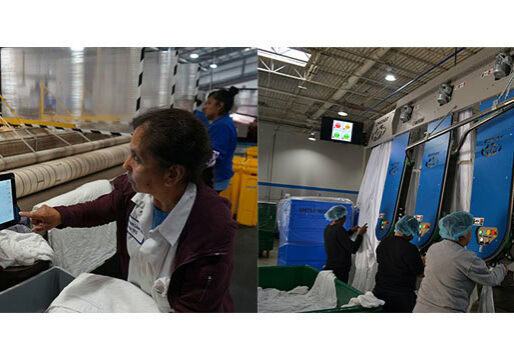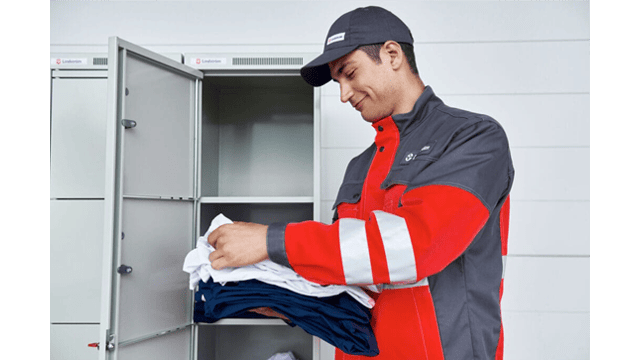Laundry operators who process napkins and other flatwork today have two options in terms of flatwork ironers: modern, large-roll deep chest ironers, manufactured either in the U.S. or abroad; and small-roll shallow chest ironers, manufactured mostly by the now-defunct American Laundry Machinery Co. This article highlights operator views and a consultant’s take on both types of equipment.
One fan of the American SuperSylon ironers is Phoebe Ellis, co-owner of Lace House Linen, Petaluma, CA. As an independent, with a focus on fine-dining establishments in the San Francisco Bay area, Ellis says she appreciates the modest outlay needed to buy or rebuild a small-roll machine. What’s more, her staff is adept at keeping these ironers in top condition, so that they continue producing a high-quality finish, particularly on small pieces. “We have several older Super Sylon ironers at Lace House,” Ellis said. “We think they are very reliable and efficient – especially with smaller pieces such as napkins, aprons and pillow slips. With eight, smaller rolls, they are able to achieve a finer finish with the smaller items. Our engineers prefer the maintenance on these ironers, as they require less upkeep and contain fewer electronic components. They just keep on rolling with very little down time.”
Another operator, Phil Sharpe, president and CEO of United Hospitality Services (UHS), Austell, GA, says he fondly recalls working with American small-roll “workhorses” at a previous job. However, because his current company specializes in hotel laundry, the newer deep-chest ironers are a better fit for his needs. “The reason why we never really pursued small-roll ironers at UHS is we realized that for high-end hospitality, large-roll ironers provide much better quality for the main items that we run, which are sheets and duvets.” He added that the company recently purchased a new 160-inch-wide (406 cm.) thermal-heated ironer from Chicago Dryer Co. The UHS team is pleased with its speed, efficiency and overall performance. “For me in this environment today doing high-end hospitality, I would not use anything other than what we have.” However, Sharpe conceded that if financing was critical, and he had a lot of small-piece work, he’d consider buying a small-roll machine. “If my budget were limited, and I needed a good, dependable ironer for small pieces, I would look for a Super-Sylon or a Hypro.”
A third operator, Roger Harris, president and CEO of Metro Linen, McKinney, TX, said that on balance, while costlier than the rebuilt small-roll machines, modern ironers offer a better investment opportunity. “The U.S.-made, smaller-diameter-roll ironers are much less-expensive to acquire,” said Harris, who formerly worked in laundry equipment sales. But he added that the cost of maintaining rolls and padding, drives, etc., is a factor worth considering. In addition, large-roll ironers offer a range of benefits. These include increased productivity, the combining of feeding and folding equipment, broader European widths, multi-lane feeding, plus folding in multiple lanes with sorting capability. “These factors all throw the benefits and return on investment into a new category,” he said. What’s more, with the use of thermal heating, as opposed to steam, the newer ironers generate more savings that make buying large-roll machines an attractive investment. “When adding the use of an alternative-heating source to the equation, I think many operators would finance the acquisition and pay for the equipment based on the future revenue generated and the resultant higher productivity cash-flow rates,” said Harris, who also serves on the Executive Committee of TRSA’s Board of Directors.
Ian Bigelow, a longtime operator who now works as a consultant, noted that the efficiency/productivity advantages of large-roll ironers are striking. He cited “stubborn nostalgia” as a source of the enduring appeal of small-roll machines. With that said, Bigelow added that well-maintained small-roll ironers can provide an excellent finish, although large-roll ironers can do so as well. In addition, the cast-iron frames of small-roll ironers are extremely durable. “They are tanks and could likely be dropped off the edge of the Grand Canyon and be expected to work at the bottom,” said Bigelow, who is co-founder and managing director of Simple Laundry Solutions LLC.
Watch for follow-up coverage of this issue in Textile Services magazine. Click here for subscription information.
Publish Date
September 22, 2023
Categories
Sign Up For Our Newsletter
Receive the latest updates on the linen, uniform and facility services industry from TRSA delivered straight to your inbox.








